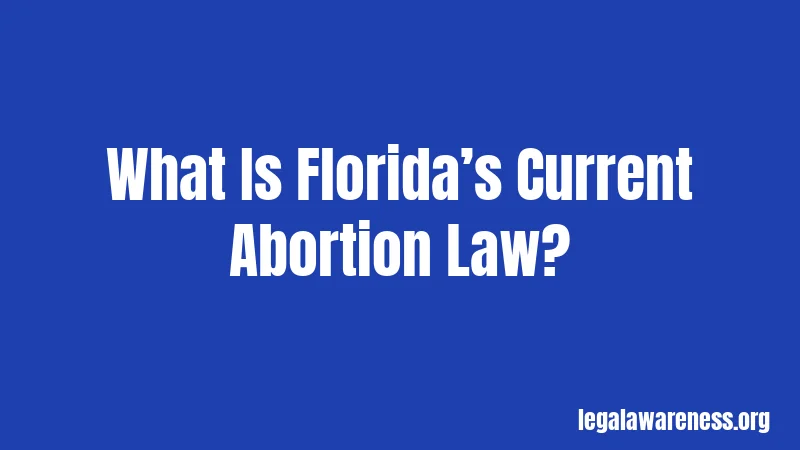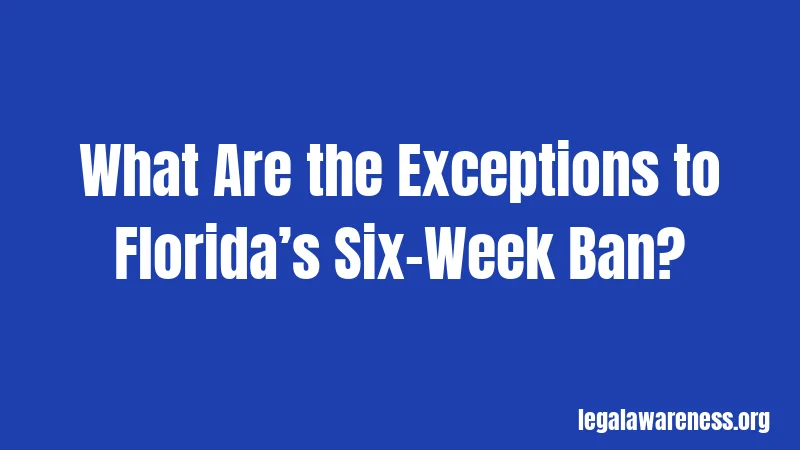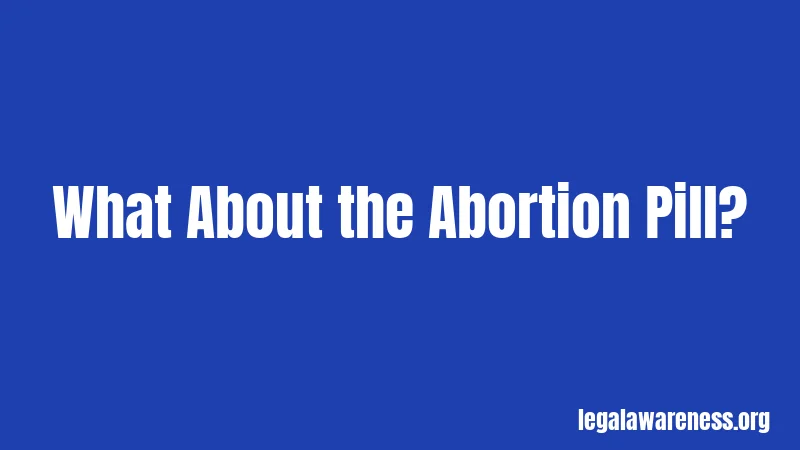Abortion Laws in Florida (2026): The Six-Week Ban Explained Simply
Most people have no idea how strict Florida’s abortion laws are right now. Seriously. If you live in Florida or know someone who does, this is important. The state now bans most abortions after just six weeks of pregnancy. That’s before many people even realize they’re pregnant.
Here’s the deal. Florida’s abortion landscape changed dramatically in 2024. And with everything that’s happened since, understanding what’s actually legal can feel confusing. Let me break it down for you in plain English.
What Is Florida’s Current Abortion Law?

Florida’s “Heartbeat Protection Act” went into effect on May 1, 2024. This law makes abortion illegal after six weeks of pregnancy. The previous limit was 15 weeks.
Why does six weeks matter so much? Because pregnancy is counted from the first day of your last period. Not from conception. That means by the time you miss your period, you’re already about four weeks pregnant. You have roughly two weeks to confirm you’re pregnant and complete two required appointments before you hit the deadline.
Sound complicated? It’s actually pretty straightforward once you understand it. But for most people, it creates a very narrow window for care.
How Is Pregnancy Calculated in Florida?
This part trips people up constantly. You’re not alone if it confuses you.
Florida law counts pregnancy from the first day of your last menstrual period. Doctors call this “gestational age.” So when the law says “six weeks,” it means six weeks since your last period started.
Here’s what that looks like in real life. Let’s say your period is regular and comes every 28 days. You’d typically ovulate around day 14. Conception would happen sometime after that. By the time you miss your period, you’re already considered four weeks pregnant under Florida law.
That leaves you with about two weeks after a missed period to realize you might be pregnant, get two in-person appointments scheduled at least 24 hours apart, and have the procedure completed. Pretty tight timeline, right?
What Are the Exceptions to Florida’s Six-Week Ban?

Okay, pause. This part is important. The law does have some exceptions.
Life-Threatening Situations
Abortion is allowed at any point if it’s necessary to save the mother’s life. It’s also allowed to prevent serious and irreversible physical harm. Two physicians must certify this in writing. If the situation is urgent and no second doctor is available, one physician can make the call.
Fatal Fetal Abnormalities
Before the third trimester, abortion is permitted if two doctors certify that the fetus has a fatal abnormality. This means a condition that’s incompatible with life outside the womb. The definition is narrow though. Some genetic conditions that are serious may not qualify under the law.
Rape, Incest, or Human Trafficking
Survivors can access abortion up to 15 weeks of pregnancy. But there’s a catch. You must provide documentation. This can be a police report, restraining order, medical record, or court document. After 15 weeks, there’s no exception for these situations.
I’ll be honest. Many experts say these exceptions are difficult to use in practice. The documentation requirements and narrow definitions create barriers for many people.
What Requirements Must You Meet for an Abortion?
Florida has several requirements beyond the six-week limit. Let’s walk through them.
24-Hour Waiting Period
Florida requires two in-person appointments at least 24 hours apart. The first visit includes lab work, an ultrasound, educational materials, and a consultation with a physician. The second visit is when the actual procedure happens.
This isn’t optional. All abortion providers in Florida must follow this rule. The only exception is for documented victims of rape, incest, domestic violence, or human trafficking.
Mandatory Ultrasound
During your first appointment, you’ll have an ultrasound. The provider must offer you the opportunity to view the images and hear an explanation. You can decline. Victims of rape, incest, domestic violence, or human trafficking don’t have to be offered this.
Physician-Only Requirement
Only a licensed physician can perform or induce an abortion in Florida. This includes prescribing abortion medication. Nurse practitioners and other providers cannot perform this care.
What About the Abortion Pill?

Yes, medication abortion is legal in Florida. But only up to six weeks of pregnancy. And there are strict rules.
The pills must be dispensed in person by a physician. No exceptions. Florida bans telemedicine for abortion care. You cannot have abortion pills mailed to you legally under Florida law. You can’t do a video appointment and get a prescription sent to a pharmacy.
This is one of the strictest medication abortion rules in the country. While federal law allows the pills to be prescribed via telehealth in many states, Florida specifically prohibits this.
Wondering what happens if you order pills from somewhere else? That’s a gray area legally. Florida’s law requires in-person dispensing by a physician. But enforcement of interstate or international pill shipments is complicated.
What If You’re Under 18?
Minors face additional hurdles. Florida requires both parental notification and parental consent before a minor can have an abortion.
This means your parent or legal guardian must know about your decision and give written, notarized permission. A stepparent or grandparent can’t provide this consent. Only your legal parent or guardian.
There used to be a “judicial bypass” option. This allowed minors to ask a court for permission if they couldn’t involve their parents. Maybe they faced abuse. Maybe their parent was unavailable. A judge could approve the abortion if they found the minor mature enough to decide.
Here’s where things get tricky. In May 2025, a Florida appeals court ruled that parts of the judicial bypass law were unconstitutional because they violated parental rights. This decision has made it much harder for minors to get an abortion without parental consent. The case may go to the Florida Supreme Court.
The exceptions that still exist include medical emergencies, emancipated minors, minors who are married or divorced, and minors who already have a child.
What Are the Penalties for Violating These Laws?
The consequences are serious. Florida’s abortion law is criminal, not just regulatory.
For Physicians
Performing an abortion that violates Florida law is a third-degree felony. That means up to five years in prison and fines up to $5,000. If the illegal abortion results in the patient’s death, it becomes a second-degree felony. That carries up to 15 years in prison and $10,000 in fines.
Doctors can also lose their medical licenses and face disciplinary action from medical boards.
What About Patients?
This is where it gets murky, honestly. The law says “any person who willfully performs, or actively participates in” an illegal abortion commits a felony. Some legal experts argue this could technically include patients. Governor DeSantis has said the law targets providers, not patients. But the language leaves room for interpretation.
Most experts believe prosecution of patients is unlikely. But the possibility exists in the statute’s language.
What Happened With Amendment 4?
You might have heard about Amendment 4. In November 2024, Florida voters decided whether to add abortion rights to the state constitution. The measure would have protected abortion until viability, around 24 weeks.
It got 57% of the vote. That’s a clear majority. But Florida requires 60% to amend its constitution. So the amendment failed by less than three percentage points. The six-week ban remains in effect.
This was the closest any state has come to protecting abortion rights without actually passing the measure.
How Has the Law Affected Abortion Access?
The numbers tell a clear story. Abortions in Florida dropped 28% in 2024 compared to 2023. The state reported about 60,755 abortions in 2024, down from 84,052 the previous year.
By mid-2025, the decline continued. Reports showed abortions down about 40% compared to the same period in 2024.
For people in the southeastern United States, this matters beyond Florida. Before the six-week ban, Florida served as an access point for patients from states like Texas, Louisiana, Alabama, and Georgia. About 9,000 people traveled to Florida for abortion care in 2023.
Now, the closest states where someone from Florida can get an abortion after six weeks are North Carolina, at about 12 weeks, or Virginia. That’s an average of 590 miles one way from Florida.
What Are Your Options If You Need Care?
If you’re under six weeks pregnant and want an abortion, you can still access care in Florida. But you need to act quickly.
Call a provider immediately. Schedule your first required appointment as soon as possible. Remember you need two visits at least 24 hours apart. Bring government-issued ID and be prepared for lab work and an ultrasound at your first appointment.
If you’re past six weeks, Florida providers can help connect you with care in other states. Organizations like Planned Parenthood have patient navigators who assist with out-of-state travel. There are also abortion funds that help cover costs.
Be cautious about crisis pregnancy centers. These are often faith-based organizations that don’t provide abortion services. They sometimes advertise in ways that make them look like abortion clinics. If you want abortion care, verify that the facility actually provides it.
Where Can You Get Help?
Several organizations can provide information and assistance.
Planned Parenthood of Florida operates clinics throughout the state. They can help whether you qualify for an abortion under current law or need to travel out of state. Their phone number is 1-800-230-7526.
The Florida-based Jane Network provides free legal support for people navigating abortion access, including minors who need help understanding their options.
IneedanA.com provides updated information on where you can access safe abortion services.
If you’re experiencing a mental health crisis related to your pregnancy, please reach out to a mental health provider or crisis line. Making this decision alone is hard. Support is available.
Frequently Asked Questions
Is abortion completely illegal in Florida?
No. Abortion is legal up to six weeks of pregnancy, with exceptions for life-threatening situations, fatal fetal abnormalities, and documented cases of rape, incest, or human trafficking up to 15 weeks.
How do I know how far along I am?
Pregnancy is counted from the first day of your last menstrual period. A provider can confirm with an ultrasound. If your period is two weeks late and you were regular, you’re already about six weeks pregnant under Florida’s counting method.
Can I get abortion pills by mail in Florida?
No. Florida law requires abortion medication to be dispensed in person by a physician. Telemedicine prescriptions and mail delivery of abortion pills are not legal under Florida law.
Do I need to tell my parents if I’m under 18?
Yes. Florida requires parental notification and consent for minors seeking abortion. The judicial bypass system that allowed courts to waive this requirement has been significantly limited by recent court decisions.
What if I was raped but didn’t file a police report?
You need documentation to qualify for the rape exception. This can include a police report, restraining order, medical record, or court document. Without documentation, the exception doesn’t apply under current law.
Final Thoughts
Florida’s abortion laws are among the most restrictive in the nation. The six-week window, combined with the 24-hour waiting period and two-appointment requirement, makes access challenging for many people.
If you’re facing a pregnancy decision, time is critical. Don’t wait to seek information and care. Whether you’re considering abortion, adoption, or parenting, getting accurate information early gives you the most options.
And remember, while this article provides general information, every situation is unique. For specific legal or medical advice, consult with a licensed attorney or healthcare provider.
References
- Florida Statutes Chapter 390: Termination of Pregnancies (https://www.flsenate.gov/Laws/Statutes/2024/Chapter390/All)
- ACLU of Florida: Know Your Rights – Abortion Access in Florida (https://www.aclufl.org/know-your-rights/abortion-access-florida/)
- Planned Parenthood of Florida: Abortion Resource Center (https://www.plannedparenthood.org/planned-parenthood-florida/medical-services/abortion/abortion-resource-center)
- Center for Reproductive Rights: Florida Abortion Laws (https://reproductiverights.org/maps/abortion-laws-by-state/florida/)
- Guttmacher Institute: Monthly Abortion Provision Study Data (https://www.guttmacher.org/news-release/2024/new-data-show-substantial-drop-abortions-florida-after-six-week-ban-took-effect)
